『永久保存版:コロナウィルスの英語表現』のご紹介

オンライン英語学習プログラム”リンガハッカーズ”では、中高生向けに英語で教養トピックを学び、ディスカッションする授業を展開しています。
今回は、世界でPandemicを起こしたコロナウィルスに関する英語表現を紹介していきます。
世界的流行病コロナウイルスが一刻も早く収束に向かうことを祈っています。
*コロナウイルスに関する情報や英語例文の真実性については個人の判断にお任せします。この記事はあくまで英語表現をまとめたものです。
コロナウイルスの英語表現
2019年に発生した新型コロナウイルス感染症はWHO(世界保健機構)によりcoronavirus diseaseはCOVID-19と正式に名称が発表されました。
coronavirus /kəˈɹəʊnəˌvaɪɹəs/ n. コロナウイルス
この単語の発音記号はIPA(International Phonetic Alphabet)を採用していますが、ローマ字で表記するとkuh-roh-nuh-vahy-ruhsとなります。カタカナで表記するのは抵抗がありますが、敢えて表記すると「クロウナ ヴァイアラス」のような響きです。コロナウイルスの語源はウイルスを拡大して見えるため、王冠の尖頭に見えるため、coronaはラテン語のcorōna(王冠)に由来しています。
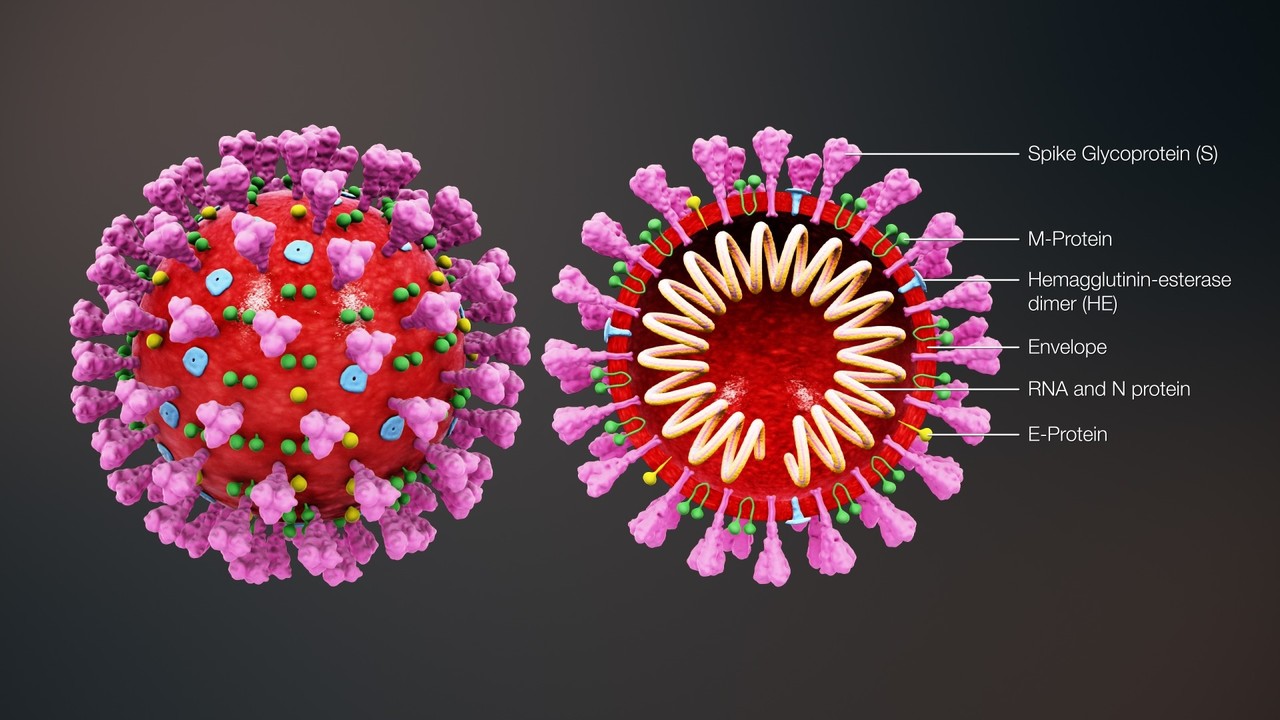
コロナウイルスのコロケーション
– the coronavirus crisis(コロナウイルス危機)
– the coronavirus outbreak(コロナウイルス発生)
– the coronavirus epidemic(コロナウイルス感染病)
– the coronavirus pandemic(コロナウイルス世界的流行病)
– the symptoms of coronavirus(コロナウイルスの症状)
– 100 cases of coronavirus(コロナウイルスの100の事例)
– due to the coronavirus(コロナウイルスのせいで)
– the spread of coronavirus(コロナウイルスの広がり)
– limit the spread of coronavirus(コロナウイルスの広がりを制限する)
– prevent the spread of coronavirus(コロナウイルスの広がりを防止する)
– slow down the spread of coronavirus(コロナウイルスの広がりを遅くする)
– Coronavirus cases continue to decrease in Germany.「ドイツではコロナウイルス感染者数は減り続けている。」
– Global cases of the novel coronavirus surpassed 9 million on June 22.「世界の新型コロナウイルスの感染者数は6月22日に900万人を超えました。」
病気の英語表現
disease /dɪˈziːz/ n. 病気
diseaseは身体の器官が機能しない病気で心臓病やパーキンソン病などで使われています。illnessは気分が悪かったり精神的な問題があるときに使います。
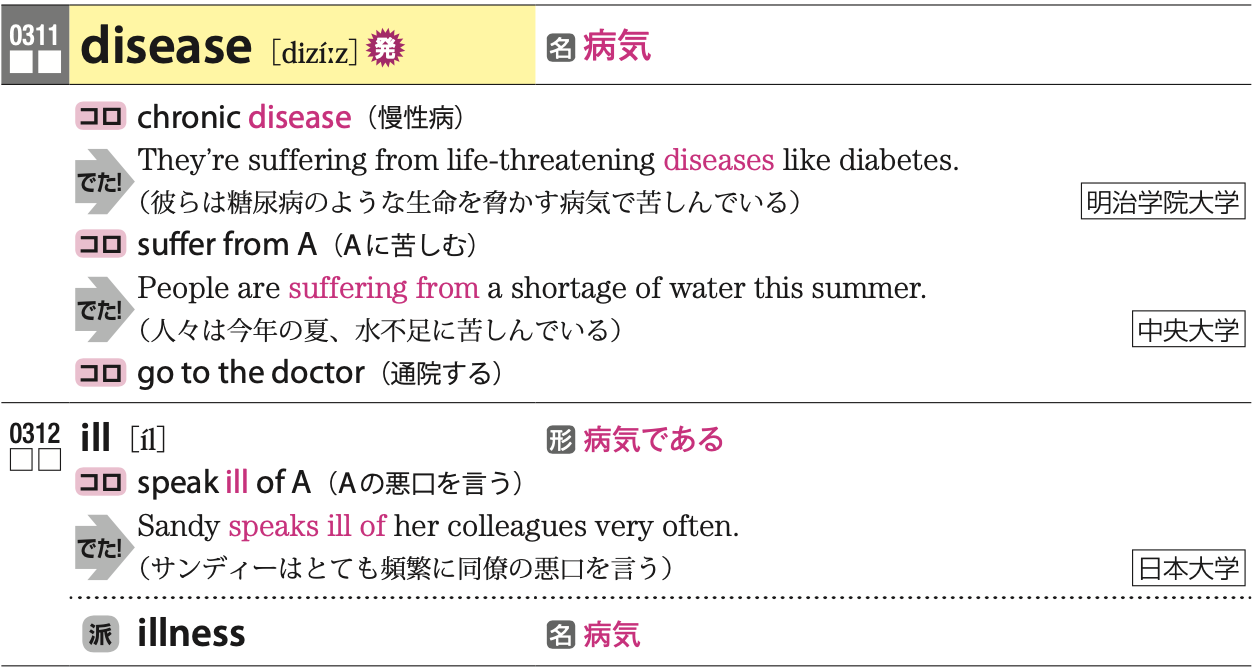
– a chronic disease(慢性病)
– an infectious disease(感染病)
– a fatal disease(致命的な病気)
– contract a lung disease(肺疾病にかかる)
– stay at home to avoid unnecessary transmission of the disease(病気の不要な伝染を避けるため家にいる)
– The disease continues to spread.「その病気は広がり続ける。」
– Cancer is a disease but it is not infectious.「癌は病気だが感染しない。」
– The disease emerged in China in December 2019.「病気は2019年12月に中国で発生した。」
– Chickenpox is a common disease among children.「水疱瘡は子どもによくある病気である。」
pneumonia /n(j)uːmóʊnjə/ n. 肺炎
– acute pneumonia(急性肺炎)
– develop pneumonia-like symptoms(肺炎のような症状が出る)
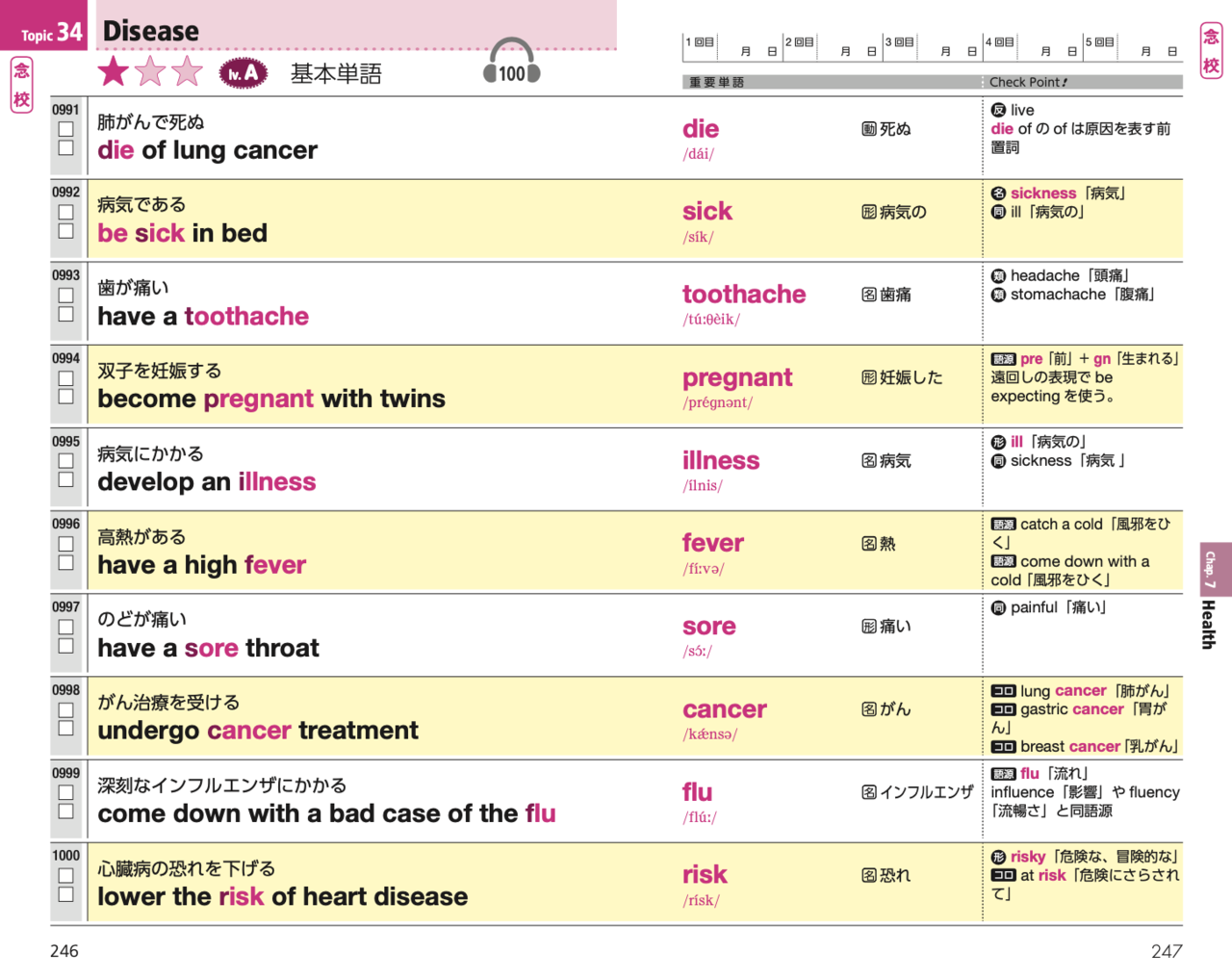
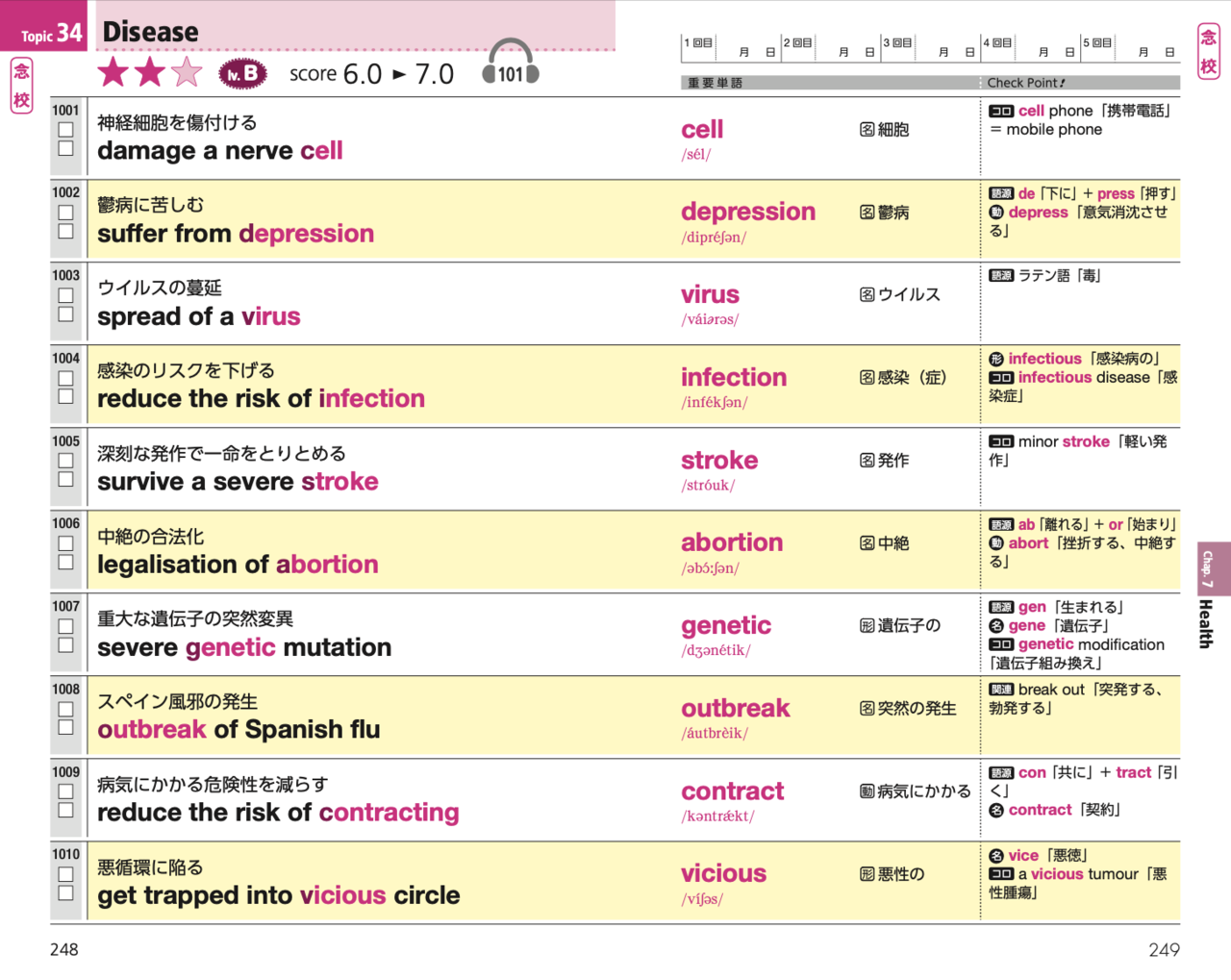
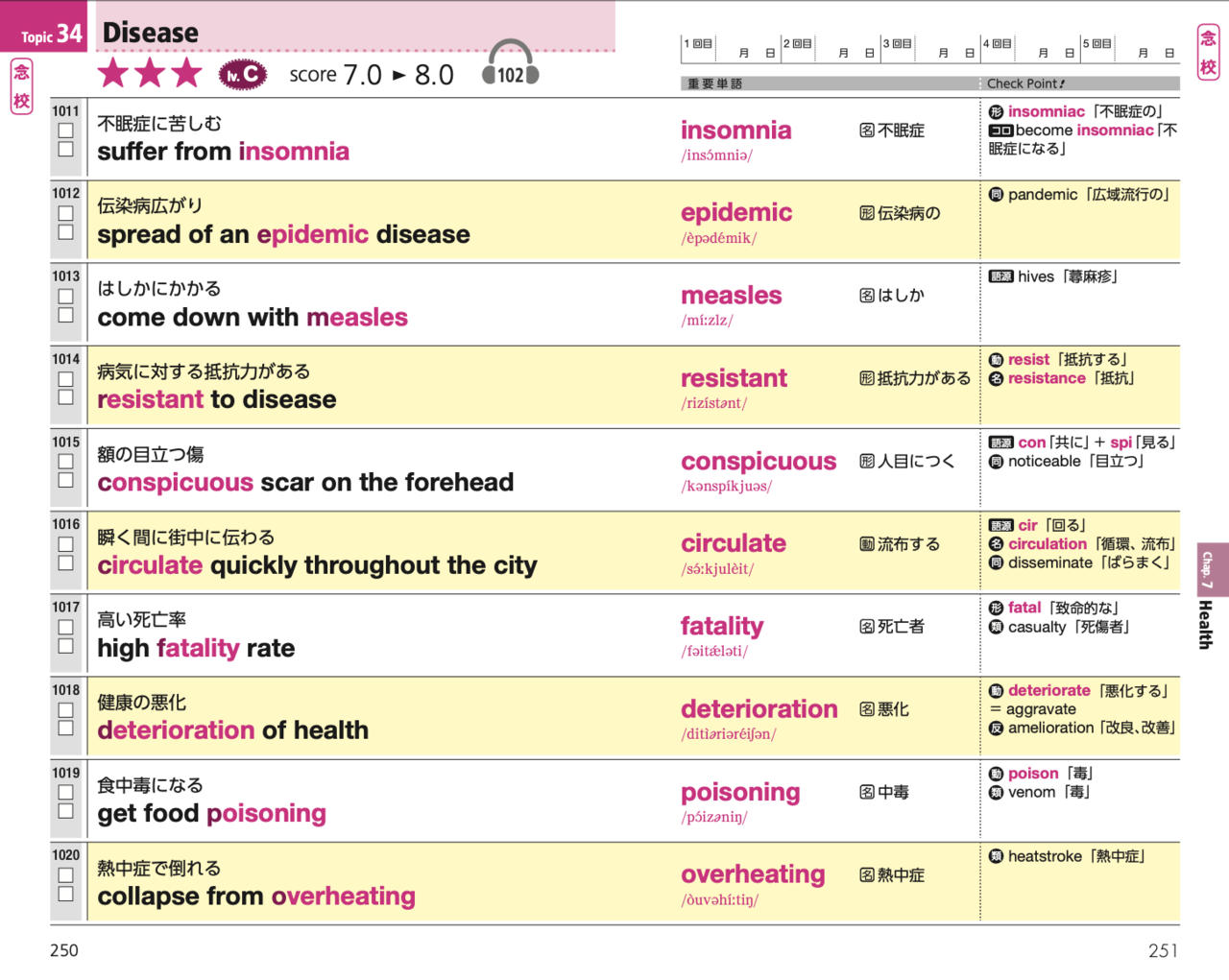
感染の英語表現
epidemic /epʌˈdemɪk/ n. 伝染病
epidemicの語源はepi(間の)+dem(人々)+ic(性質)=人々の間で広まる性質です。因みにdemocracy(民主主義)やdemography(人口統計学)のdemも同語源なのでまとめて覚えておきましょう。
– In the middle of an epidemic(異常発生中に)
– An epidemic disease broke out.「伝染病が発生した。」
– Epidemics were spread by crowded towns and trade.「伝染病は混雑した街と貿易によって広まった。」
pandemic /pændémɪk/ n. 世界的流行病
pandemicの語源はpan(全て)+dem(人々)+ic(性質)=全ての人々に広まる性質です。epidemicよりも規模が大きく影響範囲がより広い場合にpandemicが使われ、今回のコロナウイルスはpandemicに値します。
– a pandemic outbreak of malaria(マラリアの世界的流行病の発生)
– amid the coronavirus pandemic(コロナウイルス世界的流行病の最中)
– cope with the coronavirus pandemic(コロナウイルス世界的流行病に対応する)
– medical expert on the coronavirus pandemic(コロナウイルス世界的流行病の医学専門家)
– The outbreak was declared a global pandemic by the World Health Organization (WHO) on 11 March. 「その世界保健機構(WHO)によりその病気の発生世界的流行病と宣言された。」
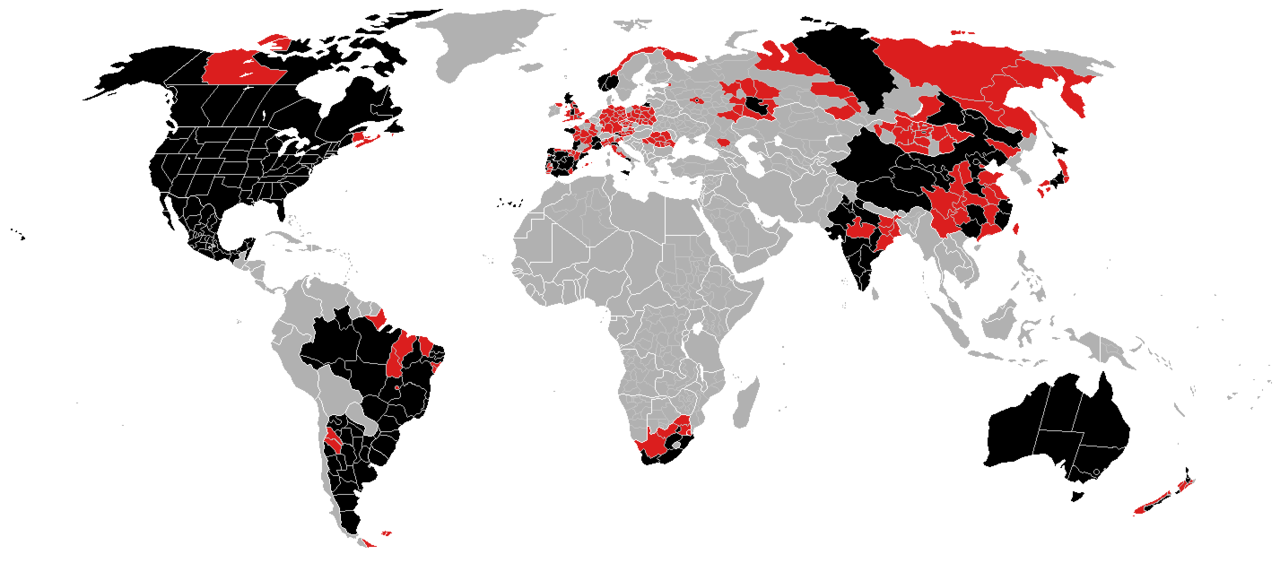
outbreak /aʊˌtbreɪk/ n. 発生
– curb the outbreak(出現を抑える)
– amid the coronavirus outbreak(コロナウイルス発生の最中)
– epicenter of the COVID-19 outbreak(コロナウイルス発生の震源地)
– because of the novel coronavirus outbreak(新型コロナウイルス発生のせいで)
– The outbreak might be near its peak.「突発的な発生はピークに近いかもしれない。」
overshoot /əʊvɜ:ˌʃu:t/ v. 超過する
オーバーシュートは「感染爆発」や「爆発的患者急増」という意味で使用されていますが、「オーバーシュート」の元々の意味は「超過する」なので患者数増加を連想するのは難しいです。

cluster /klˈʌstə/ n. 群れ
クラスターは「集団感染」という意味で使われていますが、本来の意味は「群れ」です。
infect / ɪnfékt/ v. 感染させる
infectの語源はin(中に)+fect(作る)=身体の中に入り込んで作ることから感染させるという意味になります。fic, fac, fecは「作る」という語源から派生した単語を見てみましょう。
– difficult adj. 難しい 語源:di(否定)+fic(作る)=容易には作れない
– factory n. 工場 語源:fact(作る)+ry(場所)=物を作る場所
– office n. オフィス 語源:of(働く)+fic(作る)=仕事をする場所
– fiction n. 作り話 語源:fic(作る)+tion(名詞語尾)=作られたもの
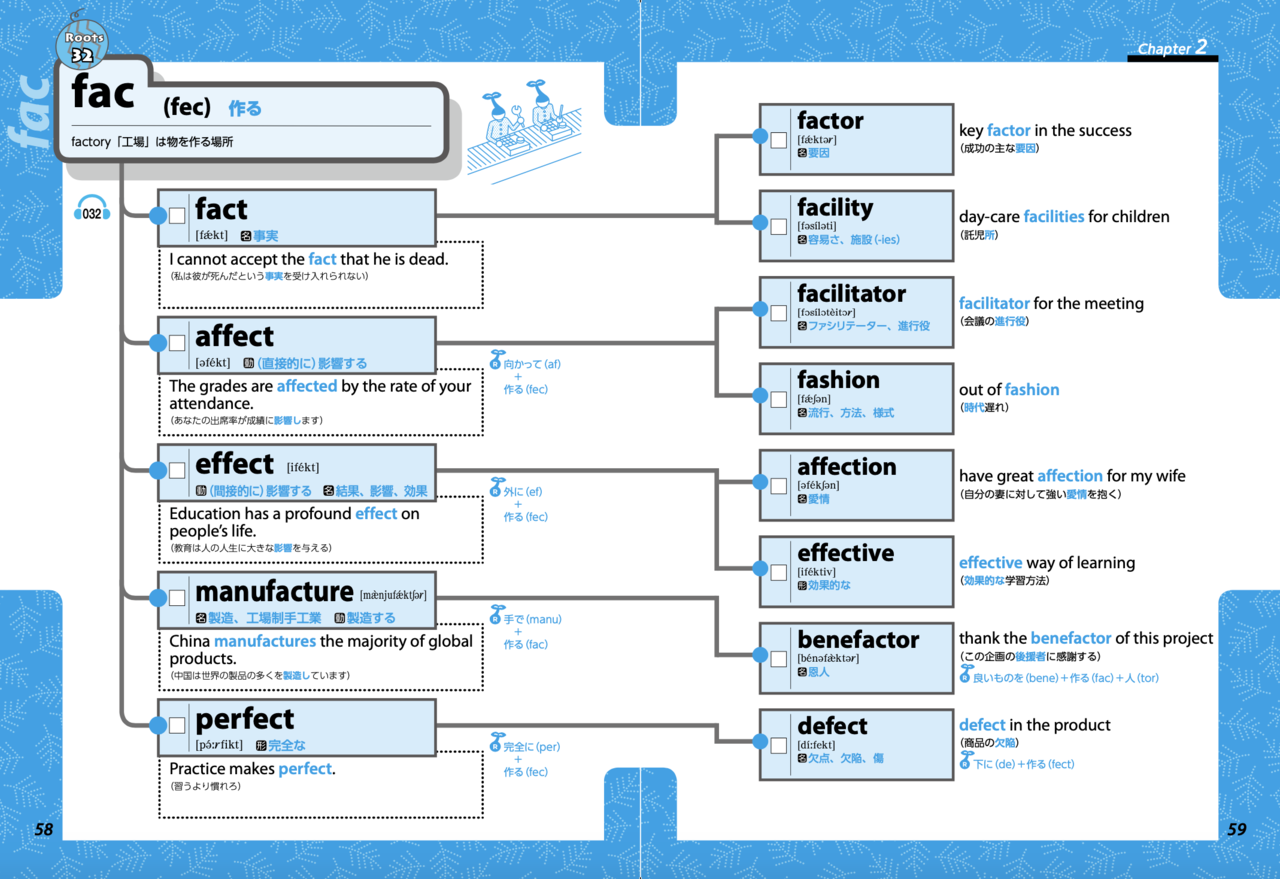
infectは使役動詞なのでbe infected(感染している)やget infected(感染する)という使い方をします。また形容詞形はinfectious「伝染病の」、名詞形はinfection「伝染病」、infectee「感染者」となります。
– get infected with A(Aに感染する)
– The cut was infected.「その切り傷が感染した。」
– An infected person coughs small droplets.「感染した人は咳をして飛沫を吐き出す。」
infection / ɪˈnfekʃʌn/ n. 感染
– cause an infection(感染症を引き起こす)
– recover from the infection(感染症から回復する)
– a nosocomial infection(院内感染)
– reduce the risk of infection(感染のリスクを減らす)
– the highest number of infections(最も多い感染数)
– The coronavirus is an infection.「コロナウイルスは感染病である。」
– The US has more confirmed infections than any other country.「アメリカは他のどの国よりも確認された感染が多い。」
– European countries have seen steep rises in infections and deaths.「ヨーロッパの国々は感染と死者数の急激な増加がある。」
infectious / ɪˈnfekʃʌn/ adj. 伝染病の
– become infectious to human(人間に伝染するようになる)
– A yawn is like a infectious disease.「あくびは感染病のようなものである。」
– The Coronavirus is more infectious than flu.「コロナウイルスはインフルエンザよりも感染力が強い。」
– If a disease can spread from one person to another, it is an infectious disease.「ある病気が人から人へと移る場合、それは感染病である。」
contagious /kʌˈnteɪdʒʌs/ adj. 接触による伝染病の *悪い意味だけではない
– Laughter is contagious.「あくびは伝染る。」
– AIDS is a contagious disease.「エイズは接触感染病です。」
contract / kəntrˈækt/ v. 病気にかかる
contractの語源はcon(共に)+tract(引っ張る)=共に引っ張り合って引き寄せあい菌が蔓延し病気にかかると覚えましょう。contractは「契約」という意味があり共に契約書にサインをしているイメージです。tractから派生した単語を見てみましょう。
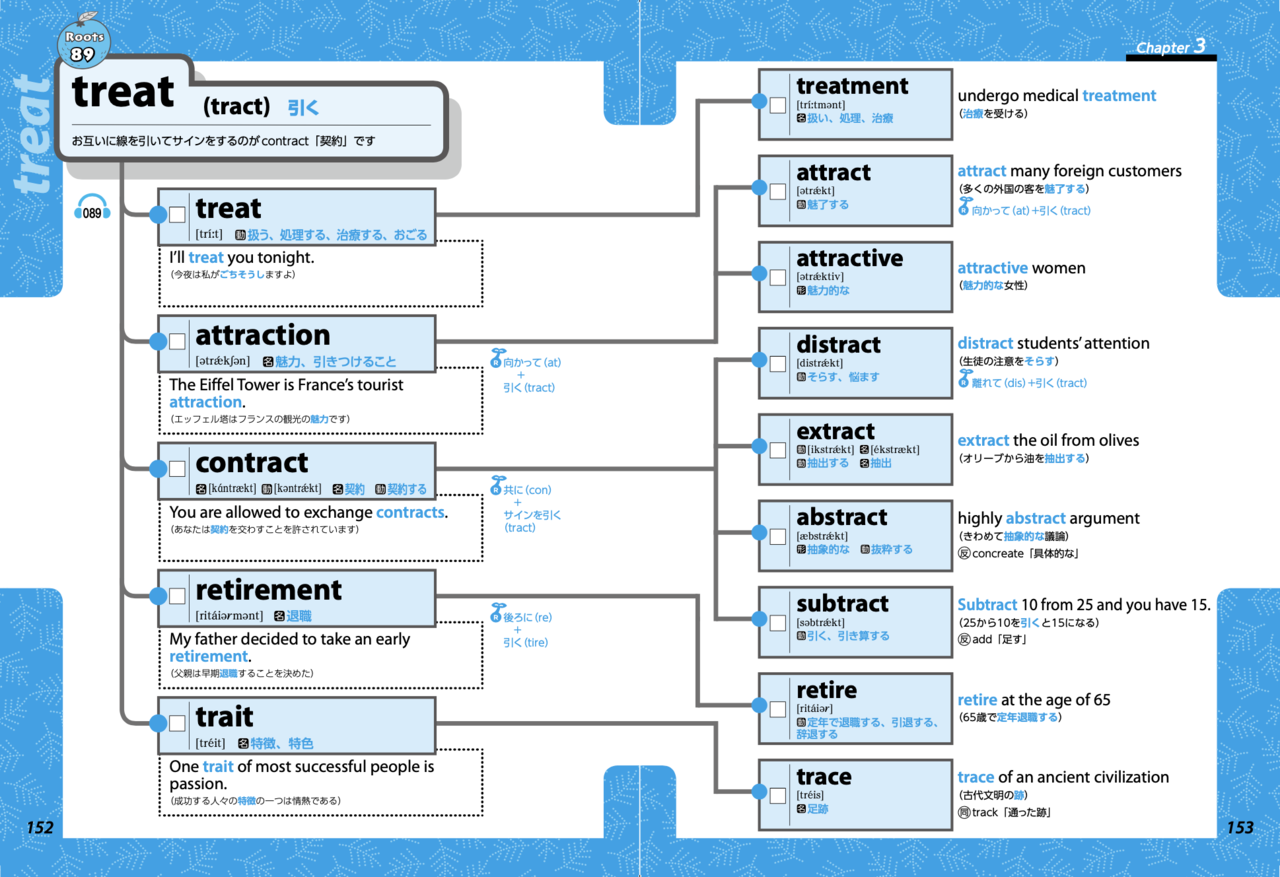
– contract coronavirus(コロナウイルスにかかる)
– My boyfriend contracted coronavirus while he was travelling.「私の彼氏は旅行中にコロナウイルスにかかった。」
隔離の英語表現
イギリスの言語学者のDavid Crystalはsocial distancingではなく物理的に接触する意味を持つphysical distancingと呼ぶべきだとTwitterで発信しています。social distancingとは直訳すると「社会的距離」ですが、日本のメディアでは「外出自粛」が積極的に使用されています。

social distancing / sˈəʊʃəl dɪstʌnsɪŋ/ 人と社会的距離を置くこと
疫学(Epidemiology)ではウイルス感染を防ぐため距離を置くことをsocial distancingと呼ぶ。6フィート距離を置くことが推奨されている。。
– maintain social distancing(社会的距離を維持する)
– practice social distancing(社会的距離を置いている)
– follow social distancing guidance(社会的距離措置に従う)
– South Korea’s aggressive social distancing measures(韓国の積極的な外出自粛対策)
– Social distancing means staying at least 2m apart.「社会的距離とは最低でも2m離れていることを意味する。」
* keep a distanceと言うが、 keep social distancingとは言わないので注意!
quarantine /kwɒɹ.ən.tiːn/ v. 伝染病予防のために隔離する n. 隔離
– be under quarantine(隔離されている)
– support the quarantine-affected clubs and artists(隔離による影響を受けたクラブやアーティストを支援する)
– Australian government has introduced quarantine regulations.「オーストラリア政府は隔離規制を導入した。」
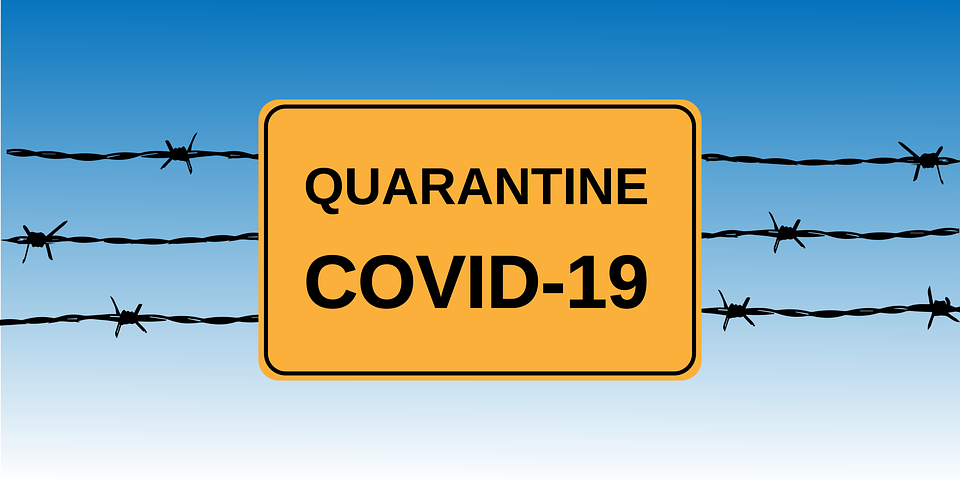
isolate /aɪsʌˌleɪt/ v. 隔離する
isolateの語源はisol(島)+ate(動詞語尾)=島のように孤立化させるで、island(島)やpeninsula(半島)と同語源です。日本のように島国で「孤立化された国」をisolated countryと言います。self-isolationは「自宅待機」とも訳すことができます。
– self-isolate(自主隔離する)
– self-isolating residents (自主隔離している住民)
– I am totally isolated.「私は完全に孤立している。」
– My parents have been self-isolating since 20 March.「私の両親は3月20日から自主隔離をしている。」
– Mr Johnson is self-isolating after testing positive for the virus.「ジョンソンは陽性が判明してから自主隔離をしている。」
– Since going into isolation, my anxiety has really increased.「隔離を始めてから不安感が増した。」
lockdown /lɒkˌdaʊn/ n. 都市封鎖
shutdownはレストランなどや公共施設の閉鎖することを意味しますが、lockdownはより強力な措置を意味し、中国湖北省武漢で行われた全道路、全交通機関の封鎖などが良い例です。
– go on lockdown(都市封鎖する)
– amid the lockdown(都市封鎖の最中)
– unwind the lockdown(都市封鎖を緩和する)
– enforce a lockdown(都市封鎖を施行する)
– impose strict lockdown measures(都市封鎖策を行使する)
– during the coronavirus lockdown(コロナウイルス都市封鎖の間)
– understand the ramifications of the lockdown(都市封鎖の効果を理解する)
– The government announced a 21-day lockdown.「政府は21日間の都市封鎖を発表した。」
The country has been under lockdown for more than six weeks.「その国は6週間以上も都市封鎖が続いている。」
病院の英語表現
hospitalのhosの語源は「おもてなし」です。救急車で運ばれるような重大な病気出ない限り、「病院に行く」はgo to see a doctorと言います。
– the likelihood of being hospitalised with coronavirus(コロナウイルスで入院する可能性)
– Ken Shimura was hospitalised on March 20 after developing a fever and being diagnosed with severe pneumonia.「志村けんは熱が出て、重度の肺炎と診断されてから3月20日に入院しました。」
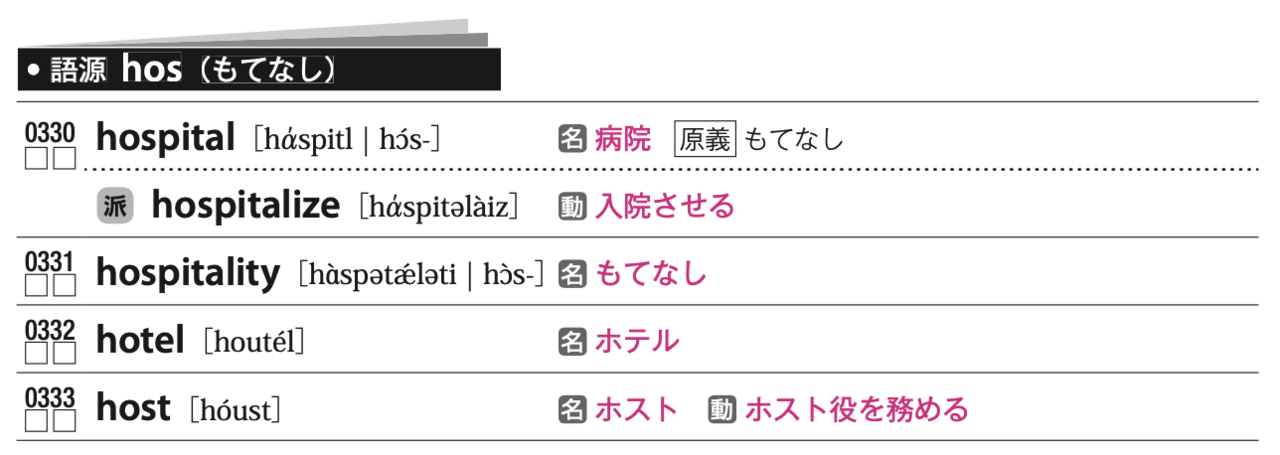
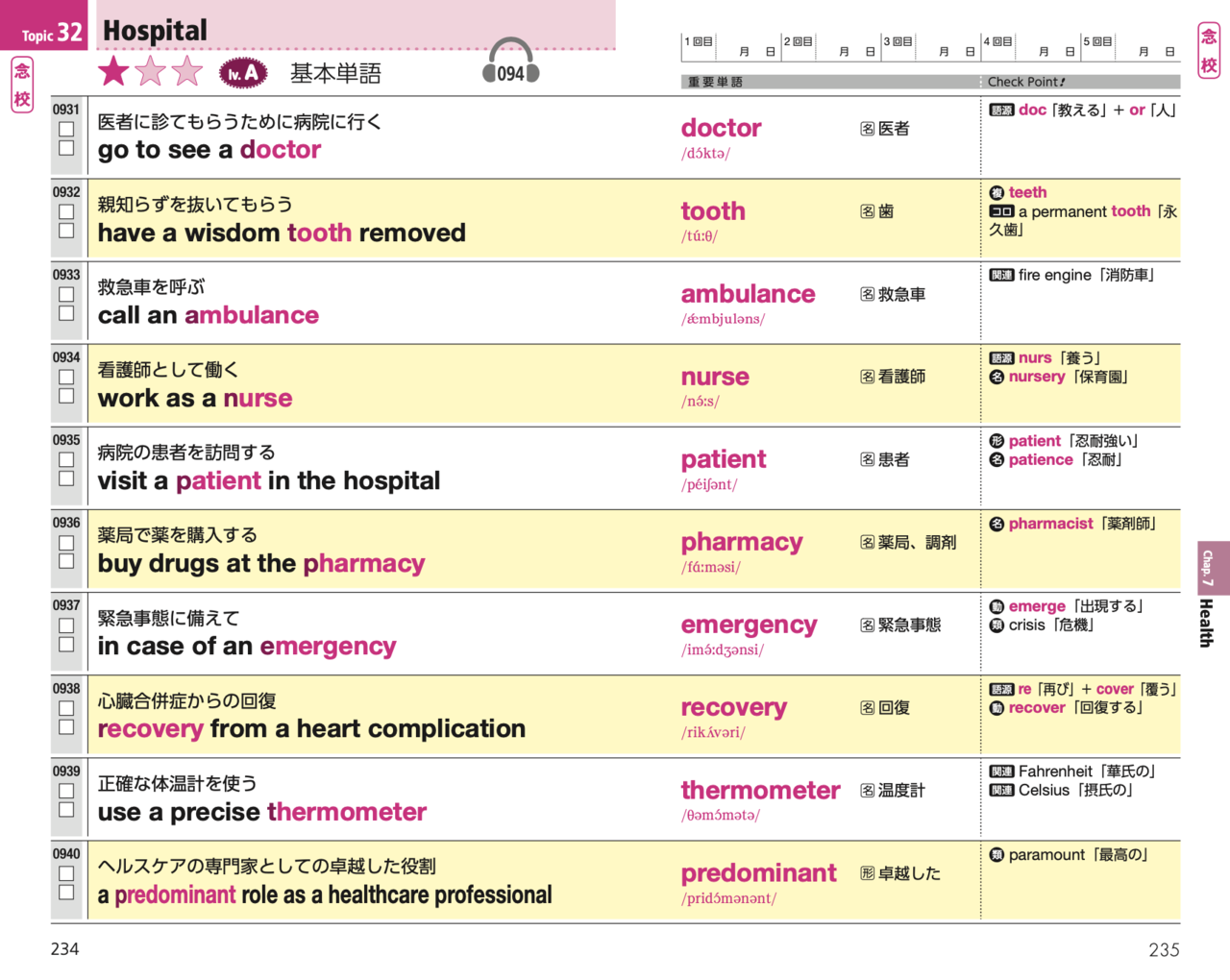
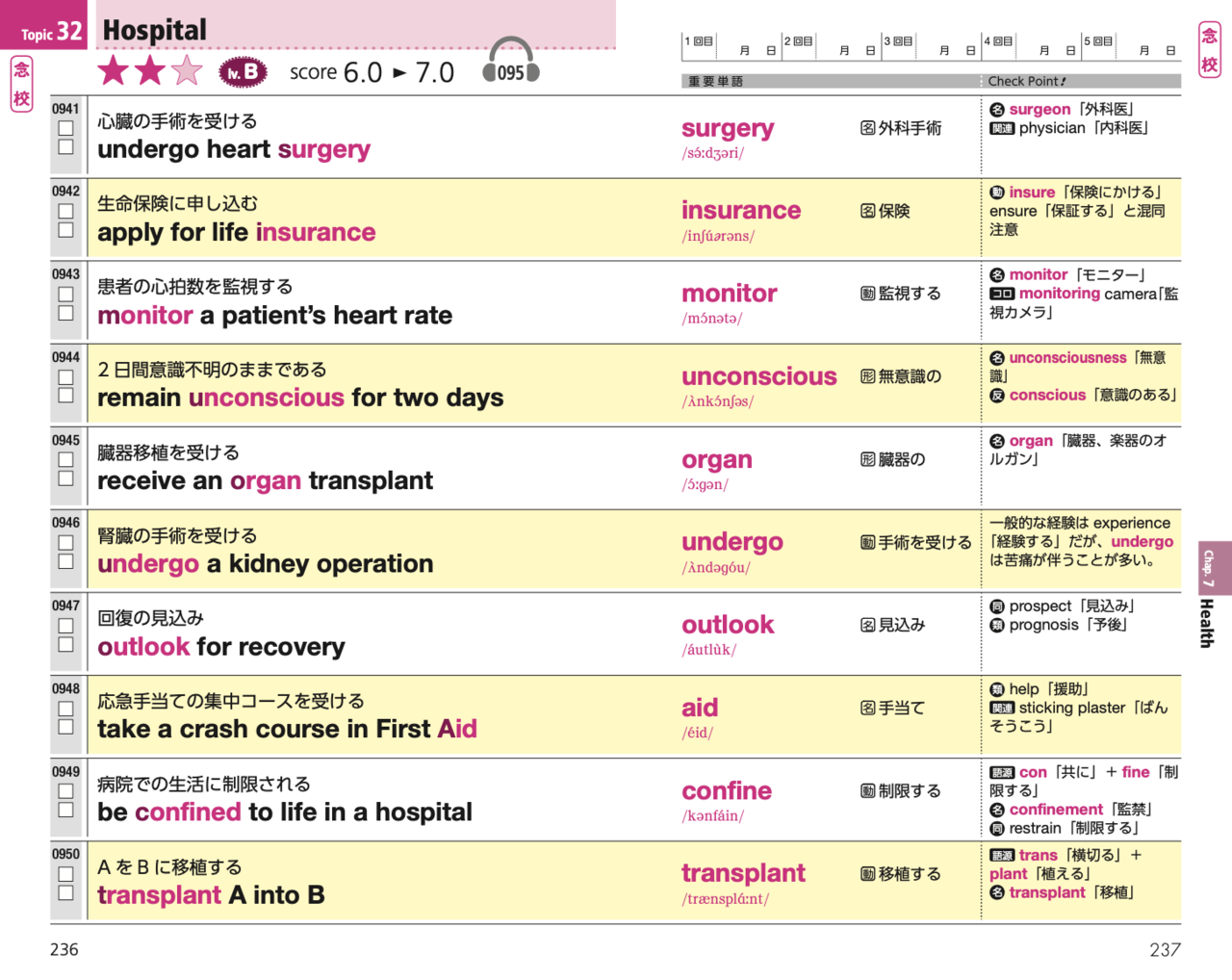
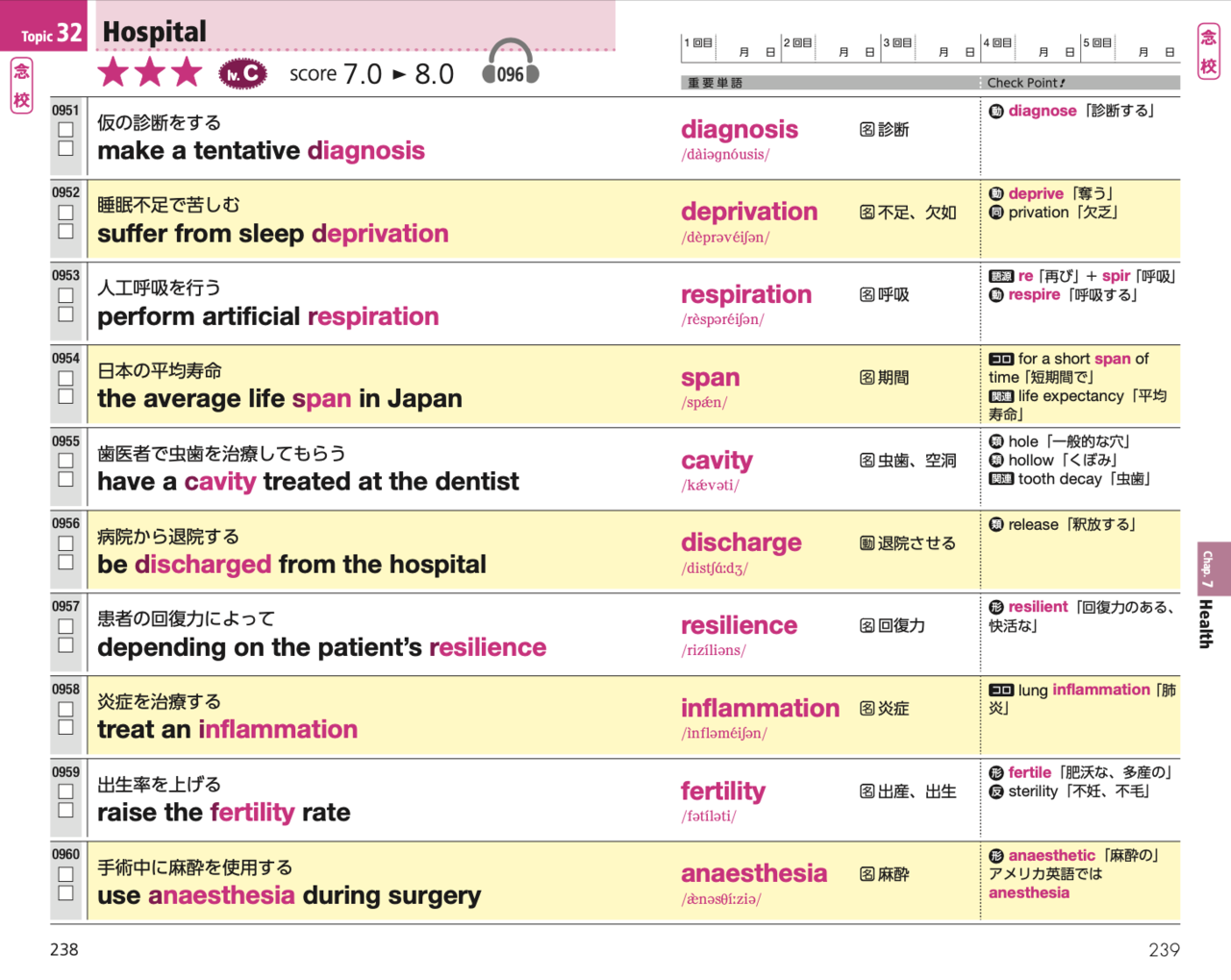
数字の英語表現
コロナウイルス関連のニュースでは数字に関する表現が多用されています。
case /kéɪs/ n. 感染者数
caseは多義語で「場合」「事例」「問題」などの意味があり、日本語でも「ケース」と言ったります。
– after a flare up of coronavirus cases
– If there’s another spike in cases, the lockdown could return.
– America is past the peak on new coronavirus cases.
– Brazil has the second-highest number of cases behind the U.S..
death toll /déθ tóʊl / 死者数
死者数を表すときには単純にdeathの動詞形die(死ぬ)を使って表現することも可能ですが、death tollの方がより堅い表現です。tollは高速道路の掲示でよく目にする「料金」や「使用料」の意味がありますが、「犠牲」や「死者数」という意味もあります。economic toll「経済的損害」も覚えておきましょう。
– The death toll exceeds 10,000.
増加・減少の英語表現
increase /ɪnkríːs/ v. 増える n. 増加
The number of cases has been increasing.「感染者数は増加している。」
gradual increase in the number of spectators at sports events「スポーツイベントでの観客の段階的な増加」
rise /rάɪz/ v. 上がる
The number of global infections continues to rise at a rate of around 1%-2% a day.
surge /sˈɚːdʒ/ v. 急上昇
– Surgical masks have become scarce as demand has surged.「需要が急増したため、マスクが品薄になっている。」
jump /dʒˈʌmp/ v. 急騰する n. 急騰
– The unemployment rate jumped to 16 percent.「失業率が16%までに急騰した。」
雇用の英語表現
work from home 在宅勤務する
– remote work(遠隔勤務)
– letting off steam(ストレス解消)
その他の英語表現
最後に紹介しきれなかったコロナウイルス重要表現をまとめておきます。
– kill the coronavirus(コロナウイルスを殺す)
– test positive for the virus(ウイルス陽性と判明する)
– restrict one’s movements(人の行動を制限する)
– restrict face-to-face contact(対面接触を制限する)
– declare a state of emergency(緊急事態を宣言する)
– ward off COVID-19(コロナウイルスを寄せ付けない)
– nationwide school shutdown(全国の学校閉鎖)
– fall ill with a virus(ウイルスで病気になる)
– remain shuttered(休業したままである)
– remain shut for the indefinite future(無期限に休業したままである)
– support children stuck at home(家にいる子どもを支援する)
– patients with symptoms(症状がある患者)
– The state of emergency will be lifted.「緊急事態宣言が解除されるだろう。」
– The coronavirus pandemic has devastated the global sporting calendar.「コロナウイルス大流行は世界のスポーツの暦を荒らした。」
– The patient has just been injected with an experimental vaccine against COVID-19.
– coronavirus countermeasures「コロナウイルス対策」
– conduct coronavirus testing「コロナウイルステストを行う」
– be in close proximity to someone infected with the coronavirus「コロナウイルスに感染している人の近くにいる」
– stem the spread of COVID-19「COVID-19の拡大を食い止める」
– spread disinformation about coronavirus「コロナウイルスに関する誤った情報を拡散する」
– in the wake of coronavirus pandemic「コロナウイルス世界的流行病を受けて」
参考文献
コロナ関連おすすめ動画集
・https://youtu.be/6Af6b_wyiwI
・https://youtu.be/BtN-goy9VOY
・https://youtu.be/5DGwOJXSxqg
みなさんの今後の賢明な判断に役立つ、英語での情報獲得に貢献できれば幸いです。世界的流行病コロナウイルスが一刻も早く収束に向かうことを祈っています。







